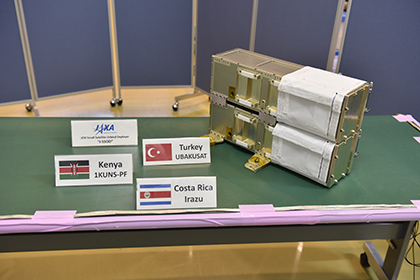This is an archive of information released in the past.
Disclaimer: It may contain broken links or outdated information. Some parts may not function in current web browsers.
*Visit https://humans-in-space.jaxa.jp/en/ for the latest information.

Experiment
- News
- Kibo Utilization Strategy
- Kibo Utilization Plan
- List of JAXA's Utilization Themes
- Experiment Facilities
- Space Environment Utilization
- Archive
Three CubeSats successfully deployed from "Kibo"!
On May 11, three CubeSats developed respectively by Kenya, Turkey, and Costa Rica were successfully and separately deployed from the Japanese Experiment Module "Kibo" at 7:30 and 7:40 p.m. After the deployment, radio waves were successfully received from the three satellites.
CubeSat being deployed from "Kibo" (Credit: JAXA/NASA)
"1KUNS-PF"--the first satellite of the Republic of Kenya
This is a CubeSat developed by a team from the University of Nairobi, selected under the first KiboCUBE programme. KiboCUBE is the dedicated collaboration programme launched in September 2015 between the United Nations Office for Outer Space Affairs (UNOOSA) and JAXA, aiming to help improve space technology in developing and other countries. As a capacity-building initiative, the programme provides opportunities to deploy cube satellites (CubeSats) from the Kibo module of the International Space Station (ISS). The satellite, co-selected by UNOOSA and JAXA in August 2016, has been under engineering coordination with JAXA for launch and deployment, and marks the first satellite developed and operated by Kenya.
"UBAKUSAT" of the Republic of Turkey
In September 2016, JAXA and the Republic of Turkey's Ministry of Transport, Maritime Affairs and Communications (MTMAC) concluded a cooperation agreement related to Kibo utilization for long-term exposure experiments using the Experiment Handrail Attachment Mechanism (ExHAM) (two times) and one CubeSat deployment using the JEM Small Satellite Orbital Deployer (J-SSOD).
The deployment of the CubeSat (named "UBAKUSAT") is based on the cooperation agreement, and aims to contribute toward the technological verification of newly developed VHF/UHF communications equipment (including a linear transponder for small satellites) and a verification experiment for space radiation measuring technology.
"Irazu"--the first satellite of the Republic of Costa Rica
The CubeSat named "Irazu" was developed by the Costa Rica Institute of Technology (TEC) and the Central American Association of Aeronautics and Space (ACAE), with technical cooperation being provided by the Kyushu Institute of Technology (Kyutech). Costa Rica's first satellite is intended to demonstrate the communication satellite technology for collecting observation data on Costa Rica's tropical forests and data on its climate, soils, and tree growth.
The deployment of the three CubeSats above was witnessed by the Cabinet Secretary of Kenya's Ministry of Education, Science & Technology, the Ambassador of Costa Rica, the Minister-Counselor of Turkey, and officials of the Japanese government at the Tsukuba Space Center.
Officials involved in the programme celebrating the successful CubeSat deployment (Credit: JAXA)
JEM Small Satellite Orbital Deployer (J-SSOD) of the Japanese Experiment Module "Kibo" with a CubeSat (Credit: JAXA)
Related topics
*All times are Japan Standard Time (JST)
| Copyright 2007 Japan Aerospace Exploration Agency | Site Policy |



